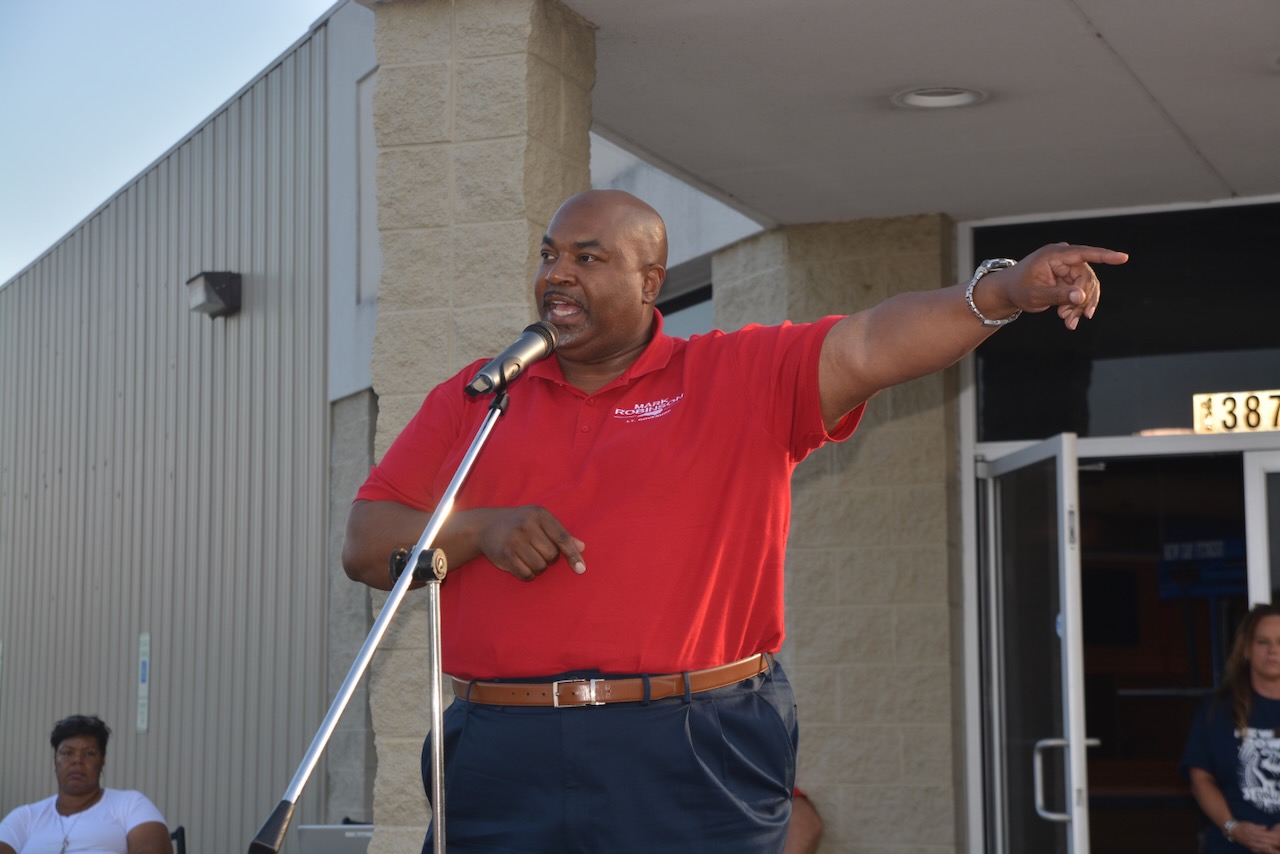During Lieutenant Governor Mark Robinson’s 2020 campaign, he claimed to spend $2,374 at a company called Lake Outfitters for “campaign clothes and accessories,” Carolina Public Press reported Wednesday.
The five transactions, recorded on his campaign finance expenditure reports with the State Board of Elections, spanned eight months.
The owners of Lake Gaston Outfitters, located at the recorded address, say those purchases never happened.
“If you actually look at the credit card statements, it’s not our business, so it was just incorrectly attributed to our business,” owner Dave Blodgett said. “We sell kayaks … We wouldn’t have anything here in our store that he would want.”
The five Lake Gaston Outfitters transactions are part of a larger investigation into Robinson’s 2020 campaign for lieutenant governor.
The campaign finance investigation, involving an alleged $500,000 in violations, remains ongoing three and a half years after the initial complaint by Bob Hall, campaign finance watchdog and former editor of Democracy NC.
Now, with less than two months until early voting begins and Robinson on the ballot for governor, the stakes are high for voters and North Carolina, Hall said.
“This is a man who wants to be in charge of a mega-billion dollar state operation,” Hall said.
“If he can’t manage a small campaign — which is what it was in 2020, it wasn’t that big — and has this continued history of financial mismanagement and is just trying to say, ‘I’m just one of the ordinary citizens who doesn’t know how to add or subtract or has problems with my taxes,’ that just does not bode well for the credentials of somebody who wants to be governor.”
The allegations
On Feb. 15, 2021, Hall sent a letter to Karen Brinson Bell, State Board of Elections executive director, identifying a series of potential violations in Robinson’s campaign finance reports.
Chief among them were two cash withdrawals — one for $2,400 and the other for $160.
North Carolina law states that campaigns cannot pay for non-media expenses greater than $50 in cash.
The two withdrawals appear to have been made to the State Employees Credit Union, where Robinson was paying off a loan at the time, according to his 2020 Statement of Economic Interest filed with the State Ethics Commission.
Hall said these cash withdrawals, in addition to the $2,374 reportedly spent at Lake Gaston Outfitters and a $4,500 reimbursement to Robinson’s wife Yolanda Hill for “campaign apparel,” could potentially violate elections law that bans the use of campaign funds for personal benefit.
Other alleged violations include:
More than 25 expenditures without a listed purpose
More than 1,400 contributions greater than $50 that do not include the donor’s occupation
At least 15 contributions greater than $100 that do not include the donor’s address
Three contributions greater than the then-limit of $5,400 per donor
Several contributions from federal PACs that were not registered to make contributions in North Carolina
A series of $4,000 contributions from family members of hog baron Wendell Murphy Sr. on the same day, which Hall said could potentially constitute an illegal use of business funds.
According to North Carolina law, violating the $50 cash expenditure limit, omitting donor information like addresses and occupations and breaking rules on how campaign contributions can be spent are Class 2 misdemeanors.
Candidates or campaign treasurers who certify campaign filings as true if they know they are not may be subject to a Class 1 felony.
Robinson has not publicly explained any of the alleged violations.
His campaign did not answer emailed Carolina Public Press questions about the Lake Gaston Outfitters charges and the other allegations in time for publication.
Don Carrington, retired executive editor of the conservative publication Carolina Journal, said he’s double-checked a number of Hall’s allegations about the Robinson campaign, and all have merit.
Carrington said sometimes the little things, like the Lake Gaston Outfitters charges, help investigators uncover larger issues.
“The campaign could have explained that if it was just an error and it was spent somewhere else,” Carrington said. “ That is very specific, so why can’t you straighten that up?”
Where does the Robinson investigation stand?
Hall doesn’t know where the logjam in the investigation is, but he knows it’s ongoing.
According to State Board policy, complainants are notified if an investigation is closed.
Hall said he wouldn’t be informed if his complaint were referred from the State Board of Elections to another agency or prosecutor, though.
While campaign finance investigations range across the board in length, Hall said a year and a half is when it gets fairly long.
“It is true that they’re under-resourced, they don’t have the staff, because this is also the same investigative office that looks at fraud in elections,” Hall said.
Carrington also doesn’t think the length is normal, and said it’s “unfortunate” that the State Board of Elections hasn’t finished addressing the complaint yet.
The state board has less staff than it did four or five years ago, said Ann Webb, policy director of Common Cause, a grassroots organization whose goal is to strengthen democracy through government accountability and transparency.
“That can be seen in the challenges that the state board is having in quickly investigating campaign finance issues, in responding to calls from the public for support, responding to enormous numbers of public records requests,” she said.
“All these things are visible to the public, and yet the legislature has continually refused to fully fund the budgets that the state board has presented.”
Webb said the legislature’s underfunding of the state board combined with “watered down” campaign finance enforcement rules have resulted in higher dollar campaigns with less accountability.
“What voters need to know is that they deserve information about who they’re voting for, and there are many factors conspiring against voters having a full picture of all the candidates on the ballot and their compliance with campaign finance rules,” Webb said.
“Voters deserve that kind of transparency, and they should demand it from their government.”
How does a campaign finance investigation work?
In recent years, the majority Republican state legislature has changed campaign finance investigation rules.
The State Board of Elections no longer conducts a public investigative hearing. Investigations are completely confidential. The board must refer its findings to the State Ethics Commission before referring a case to a district attorney. Under pre-2018 rules, Hall said the investigation would have been resolved by now.
During an initial investigation, state board staff may gather additional documents, conduct interviews and audit campaign finance reports.
Campaign finance wrongdoing doesn’t necessarily rise to the level of criminality, though it can, Carrington said.
“There’s a lot of other factors — other people would have to be involved — before it moves to something more serious that could jeopardize (Robinson’s) position as governor (if he were elected),” Carrington said.
Under current law, if the state board decides the allegations have enough merit for a criminal campaign finance violation, the board refers the case to the State Ethics Commission.
The commission then has 90 days to investigate and make a confidential recommendation to the board on whether they should refer the case to the Wake County district attorney, in the case of governor or lieutenant governor campaigns.
The district attorney can then choose whether to prosecute the case. If the DA does not act in 45 days, any registered voter in the district or board of elections can petition a superior court to appoint a special prosecutor in the case.
Non-criminal violations may be resolved through public reprimands, fines or other civil remedies. If enough evidence exists to support a civil penalty, the state board would conduct a public hearing, its policy states.
A governor cannot end an investigation, but the State Board of Elections, the Ethics Commission and the Wake County district attorney have varying degrees of control. A sitting governor must be impeached by the state Senate to be removed from office.
Not Robinson’s first rodeo
Robinson’s family isn’t new to accusations of financial mismanagement.
Robinson has declared bankruptcy at least four times, and has acknowledged past financial struggles.
Yolanda Hill, Robinson’s wife, owes the Department of Health and Human Services $132,000 for her work as a contractor for its Child and Adult Care Food Program.
As owner of Balanced Nutrition, Hill did paperwork to help DHHS get reimbursements for provided lunches.
However, an audit of a random sample of centers Balanced Nutrition works with found improper tracking of subsidized meals, as well as other violations. Carrington has been looking into the Balanced Nutrition case for a while.
“The whole (Robinson) family worked there, and they haven’t been doing things correctly, which has now resulted in a monetary amount that they need to pay back,” he said.
“It was just finally published by the department, but that’s only after investigating a small amount of her clients. She shut down her business associated with this investigation.”
Hill did not respond to a request for comment, but has publicly said she was targeted because of her connection to Robinson.
“The pattern just indicates a continued mismanagement of finances,” Hall said.
Editor's note: Sarah Michels is a staff writer for Carolina Public Press specializing in coverage of North Carolina politics and elections. She is based in Raleigh. This work is licensed under a Creative Commons Attribution-NoDerivatives 4.0 International License.









